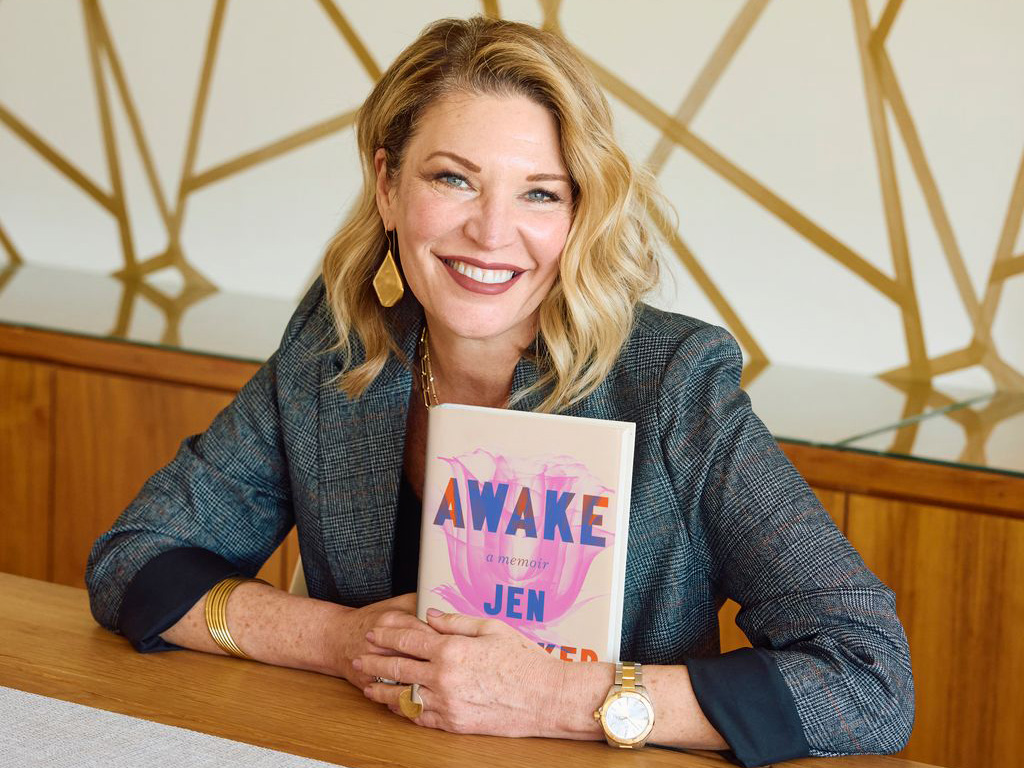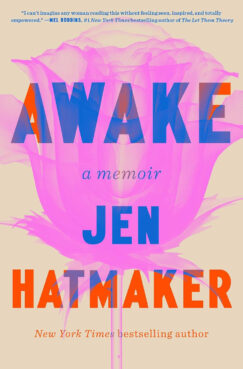
(RNS) — Jen Hatmaker married at 19 and for 26 years lived what seemed an enviable evangelical life. She had a pastor husband, five kids, a home renovation TV show and a thriving career as an author and women’s ministry leader.
Then it all fell apart.
In her new memoir, “Awake,” Hatmaker begins with the end of her marriage — a devastating middle-of-the-night discovery of betrayal — and then returns to the beginning, to the Bible college meet-cute. She chronicles the ways purity culture, complementarianism and ministry zeal both choked and fueled her fledgling marriage. And she finds there, in the evangelical origins of that love story, the seeds of what she now calls “bad fruit.”
“Awake,” which published Sept. 23, is a divorce memoir, but it is also an exvangelical testimony — whether or not she would claim that label for herself. Hatmaker’s divorce is one part of a deconstruction journey that has her reckoning with purity culture, homophobia, racism, sexism and Christian nationalism. Though these beats may sound familiar to anyone who has read of or personally experienced evangelical deconstruction, Hatmaker’s offering is fresh and funny and, given her history as an evangelical women’s leader, may serve as something of an archetype.
RNS talked with Hatmaker not long after “Awake” hit The New York Times bestseller list about the evangelical pressure to marry young, the surprising gifts of listening to her body and her ongoing religious wrestling match.
This interview has been edited for length and clarity. You can listen to the full interview on the “Saved By the City” episode, “The Risks of a Young Evangelical Marriage.”
You open the book with this reckoning around your marriage and then move into how that was connected to a religious awakening for you. How do you think of those two huge aspects of your life — your marriage and your spirituality — as being linked? How did the loss of one lead to the questioning or reconfiguration of the other?

“Awake” by Jen Hatmaker. (Courtesy image)
I mean, they’re so linked I could never unspool them. Everything I ever learned about being a girl, then a woman — being a wife, sex, purity, ministry, head of household — everything came out of my spiritual environment. So there was no separating the two. I got married when I was 19 years old. I grew up in purity culture, so sex was absolutely forbidden before marriage, which sent tons of us down the aisle as teenagers. I didn’t even know who I was at 19. Those two things arced together, and so maybe it’s not such a surprise to be sitting here in the middle of life having lost both institutions — church and marriage.
There’s this detail in your book that in one group of friends, three of you had divorced pastors. In a newsroom three is a trend. What do you think is going on there?
All of us married in college to ministry men — those men were also boys — and so they were performing spiritual masculinity in the same way we were performing spiritual femininity. Those were just such prescribed, sanctioned paths. We were all in Bible college. So, here’s this common environment that pathologizes sex, has a very gendered idea of what marriage and ministry are going to look like. And then you just plug that into the outlet, and you get this very common outcome.
By the way, zero of those three men that we have divorced are still in ministry.
It is an interesting common story to see those teenage marriages born out of a high control, spiritual, evangelical environment — where the men were like, ‘I guess what I do is ministry.’ That’s what faithful men do. And us girls were like, ‘we’ll be your wing man.’ That’s not a great system. That system robbed us all of autonomy.
But you did grow a pretty large platform — while still keeping that evangelical framework. How did that work alongside your husband’s ministry?
It’s such an interesting time to have this comeuppance at the same time as the internet; I was able to build a community and a career outside of the institution. And it was not without critique. There was that very infamous, long article that just went around and around — it would never end — about, essentially, who’s in charge of these internet ladies. I was influencing outside of the tenets of evangelicalism, and I was pressing hard on some of the forms. I was questioning some of the doctrines and disrupting some of the systems. And so: Who’s in charge of these ladies writing on their little laptops? We were just kind of out here in the Wild West, just saying whatever we wanted to say, outside of any male authority, outside of hierarchy, outside of all these systems designed to keep us in our place. I wasn’t a fan of any of that, but none of that is surprising.
You talk a fair amount in the book about learning to listen to and trust your body and your intuitions and gut. How did you learn to trust yourself?
That is one of the most diabolical results of not just purity culture but evangelicalism. We were taught this is just some fleshly container. Our citizenship is in heaven. We are soul people, not body people. These bodies are untrustworthy and suspect.
It was really interesting over the course of my divorce and recovery that my body was actually my best leader. My body led me through all the most important phases. It was my body where I first appropriately grieved. My brain was trying to talk me out of it — like we don’t have time for this — but my body allowed me to breathe. Ultimately, my body is where I found healing. I’m working on a new story for myself. I have promised my dear body — this container of mine — that I’ll never, ever, ever abandon my own wisdom again.
So much of that narrative has sexist undertones — women are considered emotional, hysterical, leading with their heart. And now we have this whole argument about toxic empathy — and that women are the problem, that the church has become too feminized.
Of course it’s gendered. This is an old system at play. Patriarchy is very adaptable. It finds a way to shapeshift into a new iteration with every generation. So this current version of patriarchy is suggesting empathy is toxic. It’s so outrageous on its face that anyone with half a damn sense is like, is this a joke? But it’s such a convenient theory, and especially since it has literally been branded by and presented by a woman. So the men are like, ‘praise God. She’s doing our dirty work for us — we can just say she said it.’ Of course it’s gendered. It always has been. Women have always been found wanting or suspicious — to keep us down, to keep us second, to keep us begging for scraps from the table. It’s exhausting. I’m so sick of it. I cannot imagine what our culture would look like if it was brave enough to follow the best impulses of women. It would just be astonishing.
Yet nearly 7,000 women showed up for Allie Beth Stuckey’s ‘Share the Arrows’ conference. Stuckey, of course, is the author of “Toxic Empathy.” So, it’s not just attractive to men — there are a lot of women who are subscribing to these ideas. There were no doubt women in that audience who used to be followers of yours. Why do you think this message might be resonating with, in particular, evangelical white women right now?
It’s so depressing to see all these women in the sunken place. I am so devastated at the lengths to which we will go to vote against and act against our own best interests. But this isn’t new. There has always been this huge contingency of women who are complicit in every work of injustice. We know we need to maintain our proximity to the men in power for our own protection. And if I’m being more altruistic — which I don’t care to be, but I guess here we are — I can understand how some of that system might feel like it delivers a sense of security. Everything right now feels chaotic and unstable. So many of our systems are fraying. So I can see how this very traditional structure in which the men have all the leadership and the women are this sort of trad-wife sidekick feels stabilizing. There’s a guaranteed outcome here: happy, stable marriages, kids who don’t rebel, and then whatever other racist and misogynistic and gendered outcomes are attached to that particular narrative. You know, ‘there will be no gays,’ I guess, or, like, ‘the Black people will probably finally behave.’ There are some real dark, dark ideologies attached to that movement.
What does Jesus mean to you? Why do you think you’ve been able to hold onto Jesus while everything else has fallen apart?
So many of my institutions have fallen away because they didn’t turn out to be true or real. They didn’t bear fruit. Or they did bear fruit, but it was bad. My structural faith has shrunk down to what I can hold in two hands. This is what I know for sure, and it’s a little bit less every year now.
I find institutional religion and Jesus two very different things. I’m very drawn to Jesus. Still. I’m very drawn to his story. I am incredibly drawn to the way he lived his years on this Earth and what he found important, what he found valuable, what he had no time for — the example he set. It’s resonant to me. I can’t ever get away from that. I included a little bit in ‘Awake’ about an interview I read years ago with Dallas Willard, and the interviewer asked him: if you had to describe Jesus with just one word, what would you say? And his answer was ‘relaxed.’ I did not grow up with a relaxed Jesus. That was not my deal. I was afraid of God and his people. And so right now, my deal with Jesus is that we’re pretty relaxed. And I really like it. I really like this version of faith in my life right now.
